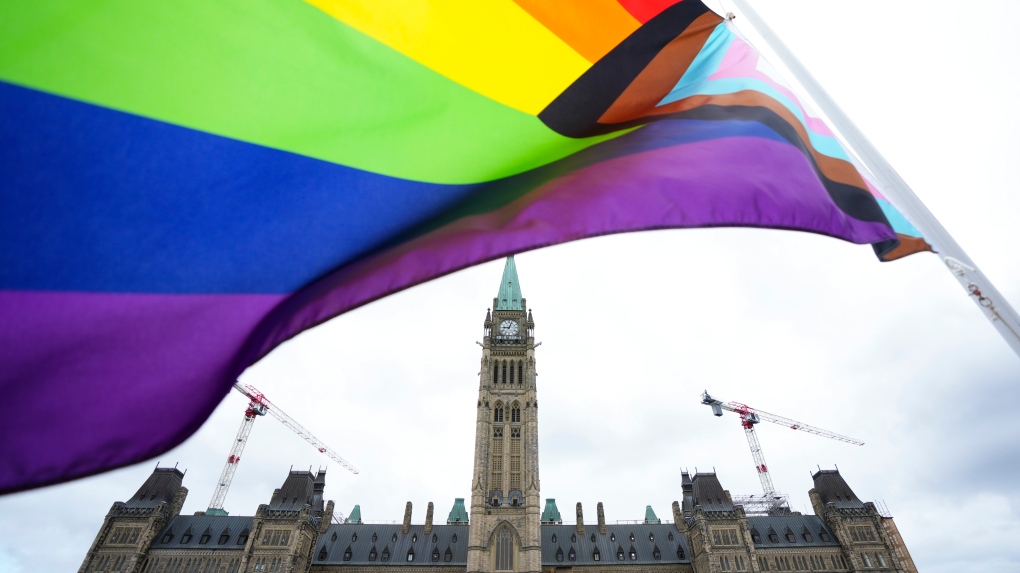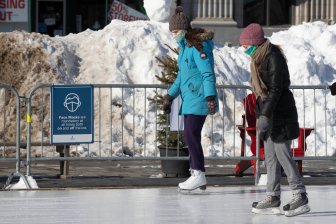News
Majority of Canadians blame feds, not provinces, for vaccine delays: poll – Global News
The vast majority of Canadians blame Ottawa rather than provincial governments for delays in COVID-19 vaccine delivery, a new poll suggests.
Sixty-nine per cent of respondents believe Canada is behind on deliveries due to federal challenges obtaining doses on the global market, according to an online survey by Leger and the Association for Canadian Studies.
Only 14 per cent of respondents point the finger at provincial governments.
Prime Minister Justin Trudeau says all Canadians who want a dose will get one by the end of September, despite recent hiccups in the production of both the Pfizer and Moderna vaccines.
Residents remain divided on whether they will be able to roll up their sleeves before October, with 44 per cent confident they will and 51 per cent skeptical.
The split suggests Canadians maintain a measure of faith in the Liberal government’s procurement efforts, said Leger executive vice-president Christian Bourque.
“People haven’t given up hope that we will get there, but they’re certainly looking for answers,” he said.
Canada sits well below the top of the heap in vaccine doses administered per 100 people, ranking 17th out of two dozen large countries — well behind Romania and just ahead of China and Russia — according to one list.

“A lot of what we hear is that Canada is falling behind. When people hear that, they automatically think it’s got to be something going on in Ottawa more than in my province,” Bourque said.
Pfizer-BioNTech cut Canada’s deliveries by more than two-thirds over four weeks while a production site in Belgium was expanded, though shipments are mounting again as the month progresses.
Moderna also shorted Canada on expected doses at the start of February — the company attributed the problem to a slower-than-expected production ramp-up at its Swiss manufacturing partner Lonza — and will deliver only two-thirds of the initially planned drop during its next shipment on Feb. 22.
Just one in five survey respondents said Ottawa should look to approve vaccines developed in Russia and China even if further delays trip up the rollout at home.

Germany became an unlikely backer of Russia’s Sputnik V vaccine earlier this month, with German Chancellor Angela Merkel saying she would consider distributing it and providing production sites to speed up the European Union’s inoculation drive.
“It seems to be gaining some momentum or public favour, but for some reasons Canadians, they’re shying away from it,” Bourque said of the Sputnik jab.
The proportion of respondents who intend to get shots when a vaccine becomes available to them continues to grow, hitting 73 per cent versus 63 per cent in mid-October.
“So the intention is there,” Bourque said.
“But again, it’s just a question of supply.”
Conducted Feb. 12 to 14, the online poll surveyed 1,535 Canadians. It cannot be assigned a margin of error because internet-based polls are not considered random samples.
© 2021 The Canadian Press
News
Ontario Legislature keffiyeh ban remains, though Ford and opposition leaders ask for reversal – CBC.ca
Keffiyehs remain banned in the Ontario Legislature after a unanimous consent motion that would have allowed the scarf to be worn failed to pass at Queen’s Park Thursday.
That vote, brought forth by NDP Leader Marit Stiles, failed despite Premier Doug Ford and the leaders of the province’s opposition parties all stating they want to see the ban overturned. Complete agreement from all MPPs is required for a motion like this to pass, and there were a smattering of “nos” after it was read into the record.
In an email on Wednesday, Speaker Ted Arnott said the legislature has previously restricted the wearing of clothing that is intended to make an “overt political statement” because it upholds a “standard practice of decorum.”
“The Speaker cannot be aware of the meaning of every symbol or pattern but when items are drawn to my attention, there is a responsibility to respond. After extensive research, I concluded that the wearing of keffiyehs at the present time in our Assembly is intended to be a political statement. So, as Speaker, I cannot authorize the wearing of keffiyehs based on our longstanding conventions,” Arnott said in an email.
Speaking at Queen’s Park Thursday, Arnott said he would reconsider the ban with unanimous consent from MPPs.
“If the house believes that the wearing of the keffiyeh in this house, at the present time, is not a political statement, I would certainly and unequivocally accept the express will of the house with no ifs, ands or buts,” he said.
Keffiyehs are a commonly worn scarf among Arabs, but hold special significance to Palestinian people. They have been a frequent sight among pro-Palestinian protesters calling for an end to the violence in Gaza as the Israel-Hamas� war continues.
Premier calls for reversal
Ford said Thursday he’s hopeful Arnott will reverse the ban, but he didn’t say if he would instruct his caucus to support the NDP’s motion.
In a statement issued Wednesday, Ford said the decision was made by the speaker and nobody else.
“I do not support his decision as it needlessly divides the people of our province. I call on the speaker to reverse his decision immediately,” Ford said.
Ontario Premier Doug Ford reiterated Thursday that he does not support Speaker Ted Arnott banning keffiyehs in the Ontario Legislature because they are “intended to be a political statement,” as Arnott said in an email Wednesday.
PC Party MPP Robin Martin, who represents Eglinton–Lawrence, voted against the unanimous consent motion Thursday and told reporters she believes the speaker’s initial ruling was the correct one.
“We have to follow the rules of the legislature, otherwise we politicize the entire debate inside the legislature, and that’s not what it’s about. What it’s about is we come there and use our words to persuade, not items of clothing.”
When asked if she had defied a directive from the premier, Martin said, “It has nothing to do with the premier, it’s a decision of the speaker of the legislative assembly.”
Stiles told reporters Thursday she’s happy Ford is on her side on this issue, but added she is disappointed the motion didn’t pass.
“The premier needs to talk to his people and make sure they do the right thing,” she said.


Stiles first urged Arnott to reconsider the ban in an April 12 letter. She said concerns over the directive first surfaced after being flagged by members of her staff, however they have gained prominence after Sarah Jama, Independent MPP for Hamilton Centre, posted about the issue on X, formerly Twitter.
Jama was removed from the NDP caucus for her social media comments on the Israel-Hamas war shortly after Oct. 7.
Jama has said she believes she was kicked out of the party because she called for a ceasefire in Gaza “too early” and because she called Israel an “apartheid state.”
Arnott told reporters Thursday that he began examining a ban on the Keffiyeh after one MPP made a complaint about another MPP, who he believes was Jama, who was wearing one.
Liberals also call for reversal
Ontario Liberal Leader Bonnie Crombie also called for a reversal of the ban on Wednesday night.
“Here in Ontario, we are home to a diverse group of people from so many backgrounds. This is a time when leaders should be looking for ways to bring people together, not to further divide us. I urge Speaker Arnott to immediately reconsider this move to ban the keffiyeh,” Crombie said.
Keffiyehs are a common garment across the Arab world, but they hold a special meaning in the Palestinian resistance movement.
Stiles said MPPs have worn kilts, kirpans, vyshyvankas and chubas in the legislature, saying such items of clothing not only have national and cultural associations, but have also been considered at times as “political symbols in need of suppression.”
She said Indigenous and non-Indigenous members have also dressed in traditional regalia and these items cannot be separated from their historical and political significance.
“The wearing of these important cultural and national clothing items in our Assembly is something we should be proud of. It is part of the story of who we are as a province,” she said.
“Palestinians are part of that story, and the keffiyeh is a traditional clothing item that is significant not only to them but to many members of Arab and Muslim communities. That includes members of my staff who have been asked to remove their keffiyehs in order to come to work. This is unacceptable.”
Stiles added that House of Commons and other provincial legislatures allow the wearing of keffiyehs in their chambers and the ban makes Ontario an “outlier.”
Suppression of cultural symbols part of genocide: MPP
Jama said on X that the ban is “unsurprising” but “nonetheless concerning” in a country that has a legacy of colonialism. “Part of committing genocide is the forceful suppression of cultural identity and cultural symbols,” she said in part.


“Seeing those in power in this country at all levels of government, from federal all the way down to school boards, aid Israel’s colonial regime with these tactics in the oppression of Palestinian people proves that reconciliation is nothing but a word when spoken by state powers,” she said.
Amira Elghawaby, Canada’s Special Representative on Combatting Islamophobia, said on X that it is “deeply ironic” on that keffiyehs were banned in the Ontario legislature on the 42nd anniversary of Canada’s Charter of Rights and Freedoms.
“This is wrong and dangerous as we have already seen violence and exclusion impact Canadians, including Muslims of Palestinian descent, who choose to wear this traditional Palestinian clothing,” Elghawaby said.


Arnott said the keffiyeh was not considered a “form of protest” in the legislature prior to statements and debates that happened in the House last fall.
“These items are not absolutes and are not judged in a vacuum,” he said.
News
Best in Canada: Jets Beat Canucks to Finish Season as Top Canadian Club – The Hockey News
[unable to retrieve full-text content]
Best in Canada: Jets Beat Canucks to Finish Season as Top Canadian Club The Hockey News





Source link
News
Health Canada sperm donation rules changing for gay men – CTV News


Health Canada will change its longstanding policy restricting gay and bisexual men from donating to sperm banks in Canada, CTV News has learned.
The federal health agency has adopted a revised directive removing the ban on gay, bisexual and other men who have sex with men, effective May 8.
The policy change would remove the current donor screening criteria, allowing men who have sex with men to legally donate sperm for the first time in more than 30 years, as part of the anonymous donation process.
This update comes after CTV News first reported last year that a gay man was taking the federal government to court, challenging the constitutionality of the policy on the basis that it violates the right to equality in the Charter of Rights and Freedoms.
According to an email Health Canada sent stakeholders informing them of the upcoming amendments to the federal directive, “sperm donors will instead be asked gender-neutral, sexual behaviour-based donor screening questions,” more in-line with the 2022 change made by Canadian Blood Services to its donation policy.
However, instead of entirely eradicating restrictions for gay and bisexual men, lawyer Gregory Ko – whose client, Aziz M., brought the case – cautioned that Health Canada will continue to bar donations from those who have had new or multiple partners in the last three months, based on rules regarding anal sex. CTV News has agreed to protect the full identity of Aziz M. out of concerns for his privacy.
Ko said while the update is an important milestone, his client intends to maintain his challenge against the Health Canada directive, “and the continued discrimination contained in this latest revision.”
“Based on our understanding of the science, there is no scientific justification for screening criteria that continues to discriminate on the basis of sexual activity and sexual orientation, since the testing and quarantine protocols already in place allow sperm banks to detect relevant infections and exclude such donations,” Ko said.
Currently, a Health Canada directive prohibits gay and bisexual men from donating sperm to a sperm bank for general use, unless they’ve been abstinent for three months or are donating to someone they know.
For example, it stops any gay man who is sexually active from donating, even if they are in a long-term monogamous relationship.
Under the “Safety of Sperm and Ova Regulation,” sperm banks operating in Canada must deem these prospective donors “unsuitable,” despite all donations being subject to screening, testing and a six-month quarantine before they can be used.
While the directive does not mention transgender or non-binary donors, the policy also applies to individuals who may not identify as male but would be categorized as men under the directive.
It’s a blanket policy that the Toronto man bringing the lawsuit said made him feel like a “second-class citizen,” and goes to the heart of the many barriers that exist for LGBTQ2S+ Canadians looking to have children.
When CTV News first reported on the lawsuit, Health Canada and various federal ministers said they would be “exploring” a policy change, citing the progress made on blood donation rules.
The update comes following “the consultations held in August 2023 and January 2024,” according to Health Canada.
This is a breaking news story, more to come…
-



 Investment15 hours ago
Investment15 hours agoUK Mulls New Curbs on Outbound Investment Over Security Risks – BNN Bloomberg
-



 Sports13 hours ago
Sports13 hours agoAuston Matthews denied 70th goal as depleted Leafs lose last regular-season game – Toronto Sun
-



 Tech14 hours ago
Tech14 hours agoSave $700 Off This 4K Projector at Amazon While You Still Can – CNET
-



 Tech13 hours ago
Tech13 hours ago'Kingdom Come: Deliverance II' Revealed In Epic New Trailer And It Looks Incredible – Forbes
-
Business12 hours ago
BC short-term rental rules take effect May 1 – CityNews Vancouver
-



 Science15 hours ago
Science15 hours agoJeremy Hansen – The Canadian Encyclopedia
-
Art11 hours ago
Collection of First Nations art stolen from Gordon Head home – Times Colonist
-



 Investment12 hours ago
Investment12 hours agoBenjamin Bergen: Why would anyone invest in Canada now? – National Post









